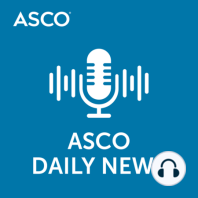23 min listen
Hot Topics and Abstract Highlights From #GI22
FromASCO Daily News
ratings:
Length:
12 minutes
Released:
Jan 27, 2022
Format:
Podcast episode
Description
Guest host, Dr. Muhammad Shaalan Beg, director for Gastrointestinal Medical Oncology at UT Southwestern's Harold C. Simmons Comprehensive Cancer Center and Dr. Manisha Palta, radiation oncologist at the Duke University Health System in North Carolina and chair of the 2022 ASCO Gastrointestinal Cancers Symposium, discuss key advances in GI oncology featured at #GI22. Transcript Dr. Shaalan Beg: I'm Shaalan Beg. I'm the director for GI Medical Oncology at UT Southwestern's Simmons Comprehensive Cancer Center. And I'm the guest host for the ASCO Daily News podcast. Today we'll be discussing key advances in GI oncology featured at the 2022 ASCO Gastrointestinal (GI) Cancers Symposium. And I'm delighted to welcome Dr. Manisha Palta, the chair of this year's GI meeting. Dr. Palta is an associate professor and radiation oncologist at Duke University Health in North Carolina. Dr. Palta, thank you for joining the podcast today. Dr. Manisha Palta: Thank you for having me. Dr. Shaalan Beg: Before we begin, I should mention that my guest and I have no conflicts of interest related to our topics today. Our disclosures are available in the show notes and the disclosures for all episodes of the podcast can be found in the show transcripts at www.asco.org/podcast. Manisha, congratulations on bringing together many diverse voices from across the country and internationally to showcase some incredible advances in GI cancer. It's been a big year. I felt that the GI space was falling behind in 2021, and it looks like we've made a lot of progress. Can you tell us about some of the practice changing studies that were featured this year? Dr. Manisha Palta: Yeah, absolutely. So, I definitely think the pandemic slowed things down from a research perspective, but this year we heard some really exciting data. And the sessions that I'd highlight in particular is the hepatobiliary pancreas oral abstracts. So, we heard a number of practice changing studies, one of which is Abstract 379, the HIMALAYA study. This was a phase 3 multi-center study looking at tremelimumab and durvalumab as first-line therapy in unresectable HCC, and was comparing that regimen to the standard of care, sorafenib. In addition to the data for HCC, also presented at this year's meeting in the oral session was Abstract 378, which was the TOPAZ-1 study looking at the systemic therapy regimen of gemcitabine and cisplatin with and without durvalumab as first-line therapy in patients with advanced biliary tract cancers. So, what we're starting to see here is the theme of immunotherapy being incorporated into first-line therapy through these abstracts that were presented. The other particularly interesting abstract in that oral session is a little bit different. Not so much systemic therapy related, but a little bit more focused on the integration of systemic therapy with local regional therapy. And that's Abstract 380, which is lenvatinib combined with TACE as first-line therapy for advanced HCC. And this was a phase 3 multi-center randomized control trial, looking at the incorporation of a local regional therapy with an approved standard systemic therapy as well. So those were the abstracts that I thought were particularly interesting and practice changing in the hepatobiliary pancreas sessions, or the pancreas and hepatobiliary day. However, I also think I would be remiss to not mention another abstract in the first day, the upper GI or esophageal gastric day. Also in the oral session, Abstract 238, which was a randomized control phase 3 trial evaluating 2 chemotherapy regimens and chemotherapy radiation in the neoadjuvant treatment of locally advanced esophagus cancer. And this is the JCOG 1109 NExT study. I think it's a really interesting area, a very exciting area of exactly how we should be managing these patients with localized esophageal gastric cancer. Whether that should be a systemic therapy approach, a chemotherapy radiation approach, or perhaps an integration of both.
Released:
Jan 27, 2022
Format:
Podcast episode
Titles in the series (100)
Key Interventions and Patient Perspectives From #ASCOQLTY21: Dr. Gabrielle Rocque, chair of the 2021 ASCO Quality Care Symposium, breast oncologist and health services researcher at the University of Alabama at Birmingham, and symposium chair-elect, Dr. Stephanie Wheeler, professor in the Department of Health... by ASCO Daily News
